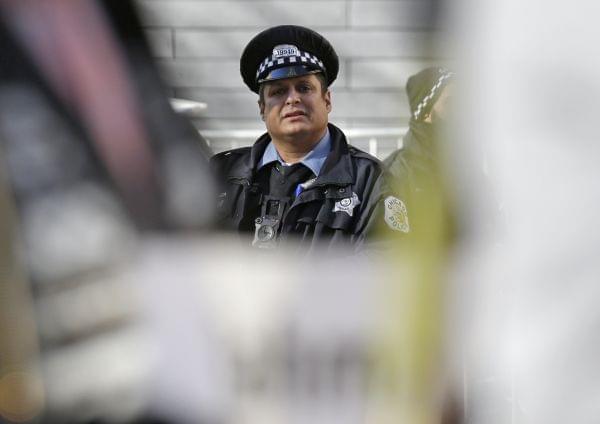Building Trust Between Police And Civilians; UIC Gymnastics Program Cut; Veteran Caregiver Mindfulness

A Chicago police officer looks to protesters during a Nov. 24, 2017 "march for justice." AP Photo/Nam Y. Huh
Happy Fourth of July! On today's special encore episode: Our interview with Tracey Meares, a central Illinois native and a Yale law professor who has spent years investigating difficult questions about the interactions between police officers and the public. Plus, the UIC women’s gymnastics team won a conference championship, but their program still got cut. We talk about that and how colleges prioritize certain sports. And caregivers for veterans are often under a lot of stress. A study shows how mindfulness therapy can help.
What do police and civilians want from their interactions with each other? That’s one of the many questions at the heart of Tracey Meares’ work. The Yale Law professor has spent a lot of time in Illinois - she grew up in Champaign and Springfield, and was a professor at the University of Chicago.
We spoke with her right before Martin Luther King Junior Day back in January, when she was the keynote speaker at the Memorial Breakfast in Springfield.
.@mearest says, according to her and Tom Tyler's research, people want 4 things from their interactions with the police:
— The 21st (@21stShow) January 21, 2019
1. "Voice" - the chance to tell their side
2. Fair decision-making
3. To be treated w/ dignity & respect
4. To feel like the authorities are trustworthy
Plus--
Earlier this year, the University of Illinois at Chicago women's gymnastics team wrapped up their last-ever home meet after 40 years of competition.
Back in the first week of the fall semester, UIC announced it would be ending both its women’s and men’s gymnastics programs, to the shock and disappointment of coaches and athletes.
Despite the news, the UIC women went out with a bang, tying for first place as co-conference champions and missing a bid to regionals by just one hundredth of a point.
In March, we spoke with Kate McGee, who reported on this for WBEZ Chicago, and Dave Ridpath, an associate professor of Sports Management at Ohio University who teaches about intercollegiate athletics.
"Being told not only that this would be their last season but being told so suddenly... many of them felt there wasn't even a really good explanation," says @McGeeReports.
— The 21st (@21stShow) March 28, 2019
"Many of them said to me 'I feel like my life's work has been ripped away.'"
Also--
This year, it's estimated that more than 200,000 service members will return home. They’ll join the 18 million veterans already living in the United States.
What does care look like for those 18 million vets? According to the RAND Corporation, about 5.5 million of them are helped primarily by ‘informal caregivers’. That could mean a spouse, sibling or child. It can also mean informal caregivers are balancing careers, relationships and other responsibilities of their own while taking care of their loved ones.
Now, a new study from researchers at the University of Illinois finds that mindfulness therapy may help alleviate some of that stress for caregivers.
Kinesiology and community health professor Sandraluz Lara-Cinisomo is the lead author of this study. Sami Anderson is a lawyer who also cares for her husband who served in Iraq.
It's estimated that more than 200,000 service members will return home to join 18 million veterans already in the U.S.
— The 21st (@21stShow) May 23, 2019
And many will need care from professionals and family members & friends.
A new study says #mindfulness could help.@KCHillinois https://t.co/D02HwGlJmy

